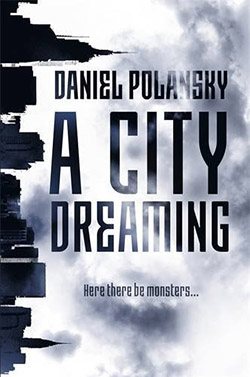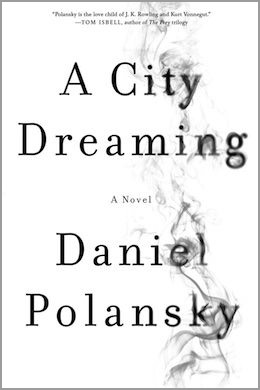He gave grimdark fantasy a knee in the rear with the wickedly witty Low Town trilogy. He tackled epic fantasy to tremendous effect across Those Above and Those Below. Now, as he turns his attention to urban fantasy by way of his brilliantly bold new book, one wonders: can Daniel Polansky no wrong?
That remains to be seen, I suppose, but he’s certainly never done anything as resoundingly right as A City Dreaming. An assemblage of loosely-connected vignettes as opposed to a work of longform fiction—although it’s also that, at the last—A City Dreaming takes some getting into, but once you’re in, it’s a win-win. Hand on heart, I haven’t read anything like it in my life.
The first couple of chapters serve to introduce M, a rogueish reprobate who straddles “the line between curmudgeonly cute and outright prickish” and can do magic, as it happens. “It would help if you did not think of it as magic,” however, as our “incandescently arrogant” narrator notes:
M had certainly long since ceased to do so. He thought of it as being in good with the Management, like a regular at a neighborhood bar. You come to a place long enough, talk up the chick behind the counter, after a while she’ll look the other way if you have a smoke inside, let you run up your tab, maybe even send over some free nuts on occasion. Magic was like that, except the bar was existence and the laws being bent regarded thermodynamics and weak nuclear force.
When M is finally called upon to pay the tab that he’s run up (and up and up) in the pub that is the entirety of Paris, he decides, after some serious soul-searching over several such snacks, that “it might be time to toddle off” to his old stomping ground in the States, because he believes he’s been gone for long enough that the many enemies he made there have probably forgotten him.
He’s wrong on that count, of course. But M’s enemies aren’t his most immediate problem. On the contrary, his most immediate problem, as he sees it, is how popular he seems to be. Pretty much from the moment he’s home, “M kept running into people he hadn’t seen in a long time, kept getting pulled into bars, parties, misadventures, tragedies.” Early on, he and his mates ride a train through time and space. Later, he’s invited to a bit of a shindig where he takes a designer drug that gives him a small god in his eyeball.
A City Dreaming isn’t in its moment-to-moment much less madcap when M manages, by hook or by crook, to keep his own company. At one point, he goes on a long walk and gets lost in a pocket universe of sorts. On another occasion he decides to do something about the unstoppable spread of artisanal coffee shops in his neighbourhood, only to find a bean-loving demon behind the scenes. In short, nothing—not even the nods towards an overarching narrative with which Polansky peppers these episodes—nothing, but nothing, stops the shenanigans.
 “It was strange how quickly a person grew used to this sort of thing, falling into a comfortable armistice with the impossible.” Strange, but true. Granted, it’s hard to get a handle on A City Dreaming if you go into it expecting a story told in the standard mold, but sometimes, less is more—and in this instance, it is. Sometimes, the incremental accretion of narrative, as if by accident, adds up to an understanding of events and their respective contexts that makes the complete picture clearer—as it does here.
“It was strange how quickly a person grew used to this sort of thing, falling into a comfortable armistice with the impossible.” Strange, but true. Granted, it’s hard to get a handle on A City Dreaming if you go into it expecting a story told in the standard mold, but sometimes, less is more—and in this instance, it is. Sometimes, the incremental accretion of narrative, as if by accident, adds up to an understanding of events and their respective contexts that makes the complete picture clearer—as it does here.
That isn’t to say the several threads that wend their way through A City Dreaming are some great shakes. If you squint at the thing from the right angle, though, they’re there. M finally falls out of favour with the Management, though he can’t imagine “why those cosmic forces, normally so inclined to look with favour upon his foolishness, had decided to avert their eyes from him.” (p.105) Not unrelatedly, I dare say, he ends up with an apprentice, which is the last thing a fly-by-night fella like M is interested in. Also, as our man avers:
“I’m starting to think I might have gotten finagled into tipping the balance of power between the two great potentates of New York City, whose continued stalemate is the only thing that keeps the place remotely tolerable.”
So there’s that. That, and the continued unconsciousness of the world turtle Manhattan Island sits on the back of. Tip of the hat to Terry Pratchett!
But just as it says on the tin, this is the story of a city, as much if not more than it is the story of a man spending time in said. A city dreaming, indeed—although M, and to a greater or lesser extent his friends and enemies, are wide awake for the duration. And A City Dreaming‘s central character isn’t just a city, either, it’s “the city,” namely New York:
Consider: say an alien being, some unworldy creature with origins in distant nebula—superintelligent lichen or a giant floating amoeba or even the ubiquitous gray—were to appear on Earth desirous of seeing what we here on terra firma call a city. Where would you take him? To smoky London? To once-divided Berlin? To Tokyo and its spires? Of course not. You would buy him a ticket to Penn Station and apologise for how ugly it is, and afterward you would step out into Midtown and you would tell him that this is what man is, for better or worse.
For better or worse—better, from my perspective—A City Dreaming is as debauched as it is divine and as drug-addled as it is dreamy. It’s quite simply the best thing Daniel Polansky has ever written—and he’s already written some brilliant things. In retrospect, it reads like the book he was born to write, and if he never writes another, well, that’d be sad, but on the back of this most marvelous medicine, I’d manage. A City Dreaming really is that remarkable.
A City Dreaming is available from Regan Arts in the US and Hodder & Stoughton in the UK.
Read an excerpt from the novel here on Tor.com
Niall Alexander is an extra-curricular English teacher who reads and writes about all things weird and wonderful for The Speculative Scotsman, Strange Horizons, and Tor.com. He lives with about a bazillion books, his better half and a certain sleekit wee beastie in the central belt of bonnie Scotland.










